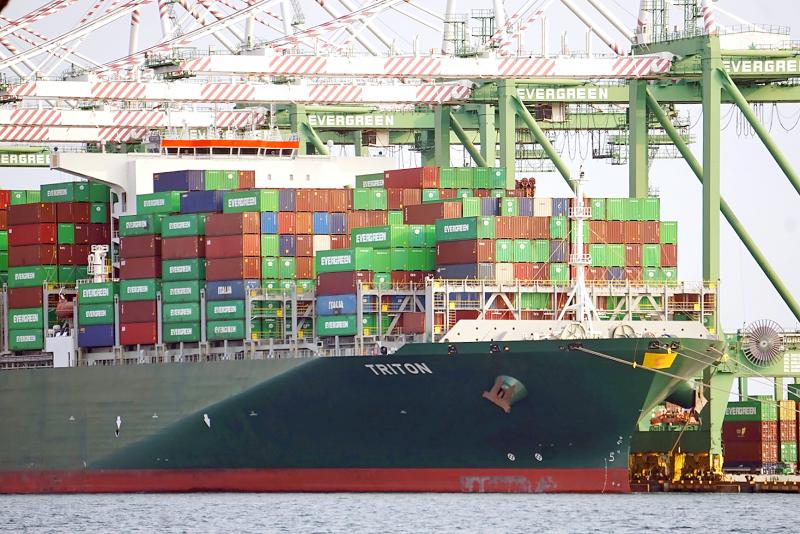Taiwan’s trade surplus should hit a new high above US$70 billion this year, largely because of ongoing robust global demand for semiconductors, the Ministry of Finance said on Tuesday.
Taiwan’s largest trade surplus to date was recorded last year at US$64.9 billion from growth in the electronic component industry, including semiconductor suppliers, the ministry said in a report.
The uptrend seen in the industry is expected to continue this year and push the trade surplus to another new high, the ministry said.

Photo: CNA
The importance of that product category was seen in Taiwan’s overall trade last year with China, including Hong Kong.
China has been Taiwan’s largest export market and its biggest import source since 2013. Taiwan’s trade surplus with the Chinese market has surged in the past few years, reaching a high of US$104.7 billion last year, the ministry said.
Given that many Taiwanese electronics companies have operations in China, the surplus in electronic components totaled US$79.4 billion last year, accounting for about 76 percent of the total.
Supporting the strong showing has been an effort by leading Taiwanese semiconductor companies to localize the supply chain, which has bolstered Taiwan’s position in the global market, the ministry said.
Taiwan’s second-largest trade surplus last year was with the US, totaling a record US$26.5 billion, as trade tensions between Washington and Beijing prompted US buyers to shift their orders to Taiwanese exporters, it said.
The US was the largest source of Taiwan’s trade surplus in information and communications technology, as well as audio and video devices, the ministry said.
The surpluses with China and the US reflect Taiwan’s comprehensive semiconductor sector and strength in technology development, the report said, adding that China and the US are likely to remain the two top sources of Taiwan’s trade surplus this year.

Sweeping policy changes under US Secretary of Health and Human Services Robert F. Kennedy Jr are having a chilling effect on vaccine makers as anti-vaccine rhetoric has turned into concrete changes in inoculation schedules and recommendations, investors and executives said. The administration of US President Donald Trump has in the past year upended vaccine recommendations, with the country last month ending its longstanding guidance that all children receive inoculations against flu, hepatitis A and other diseases. The unprecedented changes have led to diminished vaccine usage, hurt the investment case for some biotechs, and created a drag that would likely dent revenues and

Nvidia Corp’s GB300 platform is expected to account for 70 to 80 percent of global artificial intelligence (AI) server rack shipments this year, while adoption of its next-generation Vera Rubin 200 platform is to gradually gain momentum after the third quarter of the year, TrendForce Corp (集邦科技) said. Servers based on Nvidia’s GB300 chips entered mass production last quarter and they are expected to become the mainstay models for Taiwanese server manufacturers this year, Trendforce analyst Frank Kung (龔明德) said in an interview. This year is expected to be a breakout year for AI servers based on a variety of chips, as

Global semiconductor stocks advanced yesterday, as comments by Nvidia Corp chief executive officer Jensen Huang (黃仁勳) at Davos, Switzerland, helped reinforce investor enthusiasm for artificial intelligence (AI). Samsung Electronics Co gained as much as 5 percent to an all-time high, helping drive South Korea’s benchmark KOSPI above 5,000 for the first time. That came after the Philadelphia Semiconductor Index rose more than 3 percent to a fresh record on Wednesday, with a boost from Nvidia. The gains came amid broad risk-on trade after US President Donald Trump withdrew his threat of tariffs on some European nations over backing for Greenland. Huang further

HSBC Bank Taiwan Ltd (匯豐台灣商銀) and the Taiwan High Prosecutors Office recently signed a memorandum of understanding (MOU) to enhance cooperation on the suspicious transaction analysis mechanism. This landmark agreement makes HSBC the first foreign bank in Taiwan to establish such a partnership with the High Prosecutors Office, underscoring its commitment to active anti-fraud initiatives, financial inclusion, and the “Treating Customers Fairly” principle. Through this deep public-private collaboration, both parties aim to co-create a secure financial ecosystem via early warning detection and precise fraud prevention technologies. At the signing ceremony, HSBC Taiwan CEO and head of banking Adam Chen (陳志堅)